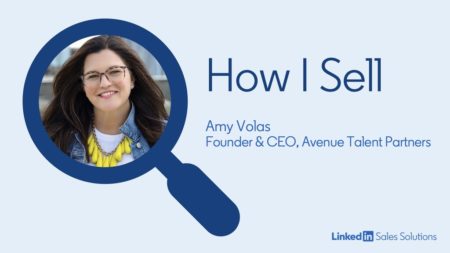
How to Standout in B2B Sales
Regardless of the company or industry, a strong sales team is essential for success.
The problem is that the sales profession is begging for a renaissance. And no, I don’t mean creating more efficiency or throwing more technology at the team. I’m talking about an overhaul to get back to what it is at its core… people doing business with other people (the bots have yet to take over).
OMG (The Objective Management Group) found that 74% of salespeople are mediocre at best.
Yikes! It’s a clear signal that it’s time to get to the root of the issue. Moreover, it shines a light on the negative stigmal of the profession. I know we can do better.
In 2021, 57% of sales reps are expected to miss their quotas. Building on this, companies across the board are struggling to meet their revenue goals.
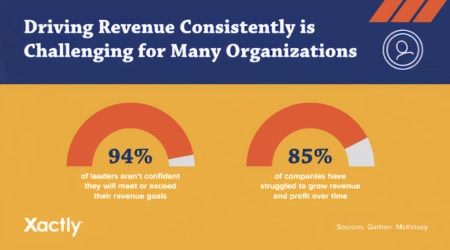
One of the key issues we face in sales is the lack of support, training, or continuing education. For example, the inability to carry a real business conversation is something that isn’t taught and one of the primary principles to realizing lasting success.
Sure, there are a plethora of people that work hard, get themselves educated, and are resilient to figure things out through trial and error. Sadly, many that have so much potential never get there and quickly exit the profession, leaving so much opportunity behind. My goal is to use this post as a way of starting to steer the ship in the right direction.
If you want to be at the top of your game, exceed expectations, and cement yourself at the top of the pile, keep reading. I’ve got you and sharing some of the things that helped me sell more than $100MM in my sales career!
Here’s what the BEST sellers are doing
Seek to understand (not assume, convince, respond, or sell)
Great sellers align with their buyers’ agenda – i.e. they listen to what their buyers want and translate that into what they need.
Put your buyers first and figure out how you can best help them achieve their goals. That means having focused conversations to talk WITH them not at them. Dig deep into each buyer’s company/industry, and seeking to fully understand what their big picture looks like. This is the only way you’ll ever be able to get them where they want to be.
It’s critical to NOT view these buyer relationships as transactional. The best sellers are looking to establish trusting partnerships with their buyers where both sides end up coming out on top over and over again. They’re playing the long game. And the only way to do that is to back your words up through meaningful action.
Sales teams that work closely with buyers and set goals together, succeed together. So put your quota numbers to the side and figure out how you can bring the most value to your buyers. When you do this work consistently, that’s when the results and money follow.
In the words of Les Brown, “Help others achieve their dreams and you will achieve yours.”
Know why buyers engage and ultimately buy
Buyers don’t buy from a company because they want to have dinner with you or because you wore them down with your crappy 80-point cadence.
If you want buyers to buy – or even engage in the first place – you need to understand why.
These are the 5 reasons why buyers take action to engage:
- You can help them solve problems
- You can help them get better
- You can help them reach goals
- You can help them pinpoint blindspots
- You can help them be the hero of their story not yours
One of my favorite Zig Zigler quotes: “You can have everything in life you want if you will just help enough other people get what they want.”
Continuously hone their craft
Sales is iterative and the very best not only realize this, they embrace it to focus on getting better.
Let me be clear, getting an offer for a new sales role isn’t a cue to stop improving your sales chops. When other people are coasting, the best salespeople are constantly pushing to improve. They try new things, they look at failure as an opportunity to learn, and they keep an open mind.
I witnessed someone get hired for a top role with 7-figure earning potential. They proceeded to let it get to their head and thought they had all the answers. Instead of focusing on the work, continual learning, and honing their craft, they decided to let their ego drive the bus to focus on building their personal brand not their pipeline.
Long story short, that 7-figure earning potential flew out the window along with the role.
A personal brand means nothing without the work to back it up. The path to a long, successful sales career is letting the merits of your work develop your professional reputation.
As the very wise Doug Landis says, “you don’t claim your brand, your brand claims you.”
A huge part of this is honing your ability to have a sales conversation. After all, if you can’t open a conversation, how on earth can you close one and vice versa?!
See for yourself what Gong.io found when they analyzed sales calls for talk-to-listen ratios of top performers and everyone else:

Courtesy of Gong.io and Hubspot
It sounds counterintuitive and it’s oh so tempting to dominate the conversation, but listening is far more important than pitching in a discussion. Listening is the critical piece that leads to understanding.
Keep in mind that your sales conversation skills can ALWAYS be improved. All deals are different and all buyers are different. And why we have two ears and one mouth for a reason.
The wider your skillset and understanding of what it takes to work with different people/companies/products, the more fruitful your sales conversations will be.
And when it comes to building skills, these 4 C’s hit the key areas to focus on:
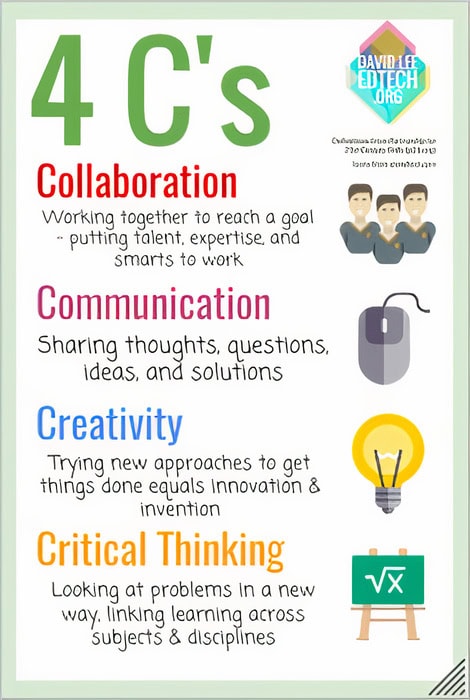
Top salespeople all share this trait too: they don’t guess about anything. They’re patient and seek concrete answers to their questions BEFORE the pitch so that they come in understanding every aspect of their prospect’s process, problems, and business goals going in.
** For anyone out there looking to improve their sales chops, I run a weekly virtual sales happy hour alongside Scott Leese called Thursday Night Sales where we answer sales questions, offer insights/expertise, and help people connect with other sales leaders. Join us, you’re a stranger but once! **
Your pipeline trumps everything else
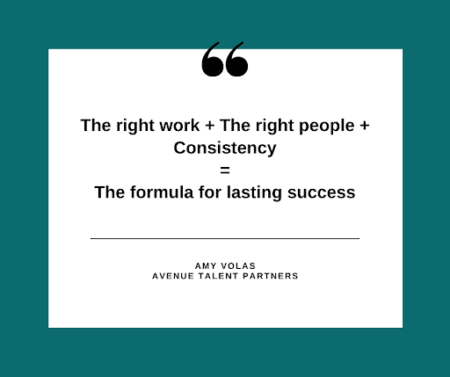
Without a pipeline, you don’t have a customer and without a customer, you don’t have a business or a job.
The work you do today shapes what happens in the future. It’s an infinite game. If you have a lucrative month/quarter, happy day! But if you take your foot off the gas to celebrate you’re going to pay for it later on. We truly reap what we sow, especially in sales.
Doing the right work with the right people consistently is the name of the game and how you build a strong pipeline. Also, it insulates you from having to chase your tail at the 11th hour, tempting you to resort ot icky tactics that work against you.
Focus on building a pipeline with an abundance of solid opportunities for the short, near, and long term.
When you have that in your back pocket, it allows you to show up and have a real business conversation to confirm or deny if you’re aligned with your potential buyers. There’s not a ton of pressure on you to close any particular deal, because you have others to fall back on. And when it’s a “no thank you,” the door is wide open because you were a “gracious loser” as my friend Sam McKenna puts it.
Remember: if a deal is starting to go south don’t try to pull out the icky sales tricks or deep discounts to turn it around. View every interaction as a long-term relationship and how you’re setting the stage for expectations with your buyers. It’s a big, small world and you never know what opportunities will come your way in the future if you maintain a good rapport with everyone. The best way to think about it is to build a pipeline for a lifetime.
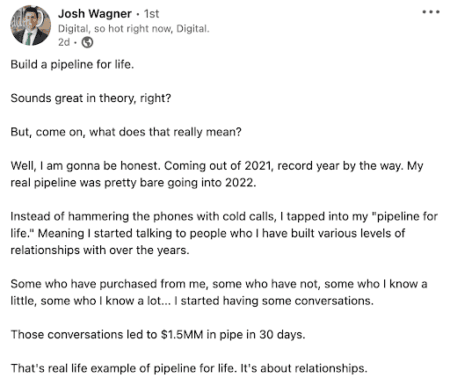
How to know if sales is right for you.
The last thing you want is to dive into sales and end up contributing to what makes sales feel icky in the first place. That means being proactive upfront to make sure it’s the right path for you.
Not everyone is built for a sales career.
It’s important to know what you’re getting into before you land a job and are knee-deep in the weeds. Sales is NOT easy, but it can be a super rewarding and fulfilling career. There’s nothing quite like getting a big deal signed that you worked so hard for.
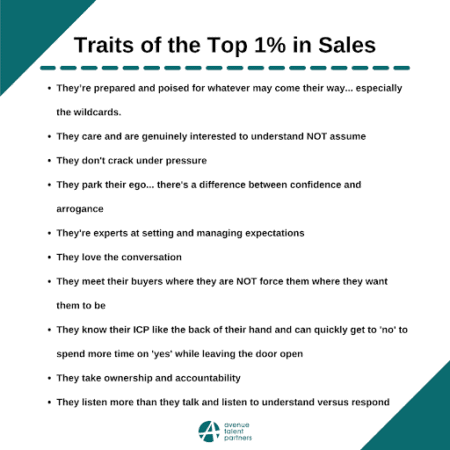
If you like looking for shortcuts, using slick language to persuade people into agreeing with you, or enjoy talking about yourself, it’s time to think of a different profession. A successful sales career requires curiosity, care, collaboration, problem-solving, communication, adaptability, resilience, patience, and a thick skin.
But the beauty of sales is that it’s a career path that lets you take the reins. The more you put into it, the more you’ll get in return and the better your results will be.
Wrapping Up
Whether you’re leading a sales team and have been in the game for a long time or you’re just getting your feet wet in sales, following these traits of the cream of the sales crop will never work against you.
Regardless of the stigma, sales is an integral part of business. If you don’t sell anything, you don’t have a business… regardless of how remarkable the product is.
If you commit yourself to your sales career, put in the effort, become a student of your craft, care about meaningful connections, and always focus on providing value, you’ll be paving the way for lasting success.
